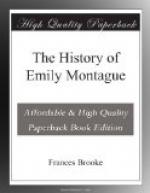I begin to think I may be blest in the possession of my Emily, without betraying her into a state of want; we may, I begin to flatter myself, live with decency, in retirement; and, in my opinion, there are a thousand charms in retirement with those we love.
Upon the whole, I believe we shall be able to live, taking the word live in the sense of lovers, not of the beau monde, who will never allow a little country squire of four hundred pounds a year to live.
Time may do more for us; at least, I am of an age and temper to encourage hope.
All here are perfectly yours.
Adieu! my dear friend,
Your affectionate
Ed.
Rivers.
LETTER 170.
To Mrs. Temple, Pall Mall.
Silleri, Aug. 6.
The leave of absence for my father and Fitzgerald being come some weeks sooner than we expected, we propose leaving Canada in five or six days.
I am delighted with the idea of revisiting dear England, and seeing friends whom I so tenderly love: yet I feel a regret, which I had no idea I should have felt, at leaving the scenes of a thousand past pleasures; the murmuring rivulets to which Emily and I have sat listening, the sweet woods where I have walked with my little circle of friends: I have even a strong attachment to the scenes themselves, which are infinitely lovely, and speak the inimitable hand of nature which formed them: I want to transport this fairy ground to England.
I sigh when I pass any particularly charming spot; I feel a tenderness beyond what inanimate objects seem to merit.
I must pay one more visit to the naiads of Montmorenci.
Eleven at night.
I am just come from the general’s assembly; where, I should have told you, I was this day fortnight announced Madame Fitzgerald, to the great mortification of two or three cats, who had very sagaciously determined, that Fitzgerald had too much understanding ever to think of such a flirting, coquetish creature as a wife.
I was grave at the assembly to-night, in spite of all the pains I took to be otherwise: I was hurt at the idea it would probably be the last at which I should be; I felt a kind of concern at parting, not only with the few I loved, but with those who had till to-night been indifferent to me.
There is something affecting in the idea of the last time of seeing even those persons or places, for which we have no particular affection.
I go to-morrow to take leave of the nuns, at the Ursuline convent; I suppose I shall carry this melancholy idea with me there, and be hurt at seeing them too for the last time.
I pay visits every day amongst the peasants, who are very fond of me. I talk to them of their farms, give money to their children, and teach their wives to be good huswives: I am the idol of the country people five miles round, who declare me the most amiable, most generous woman in the world, and think it a thousand pities I should be damned.




